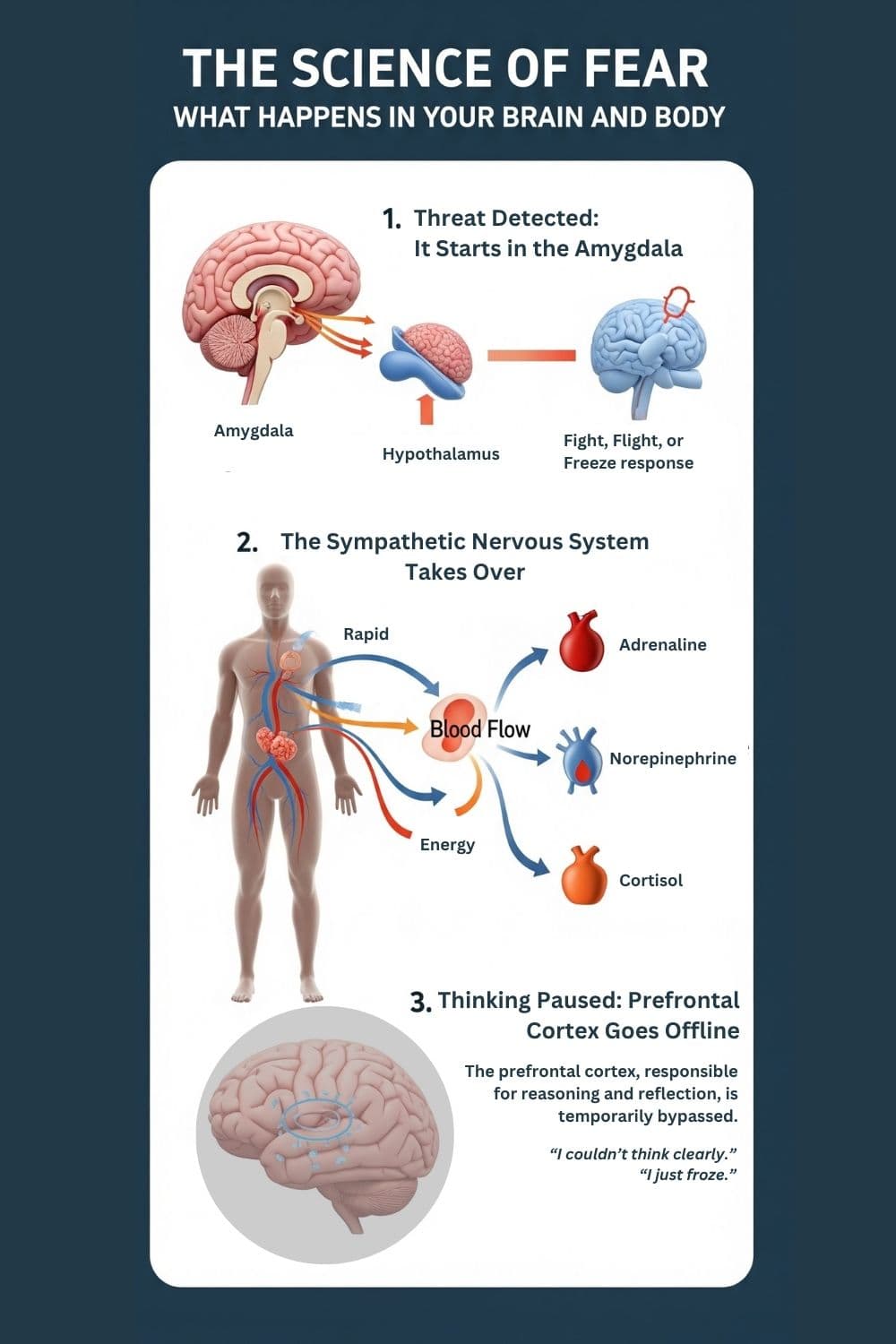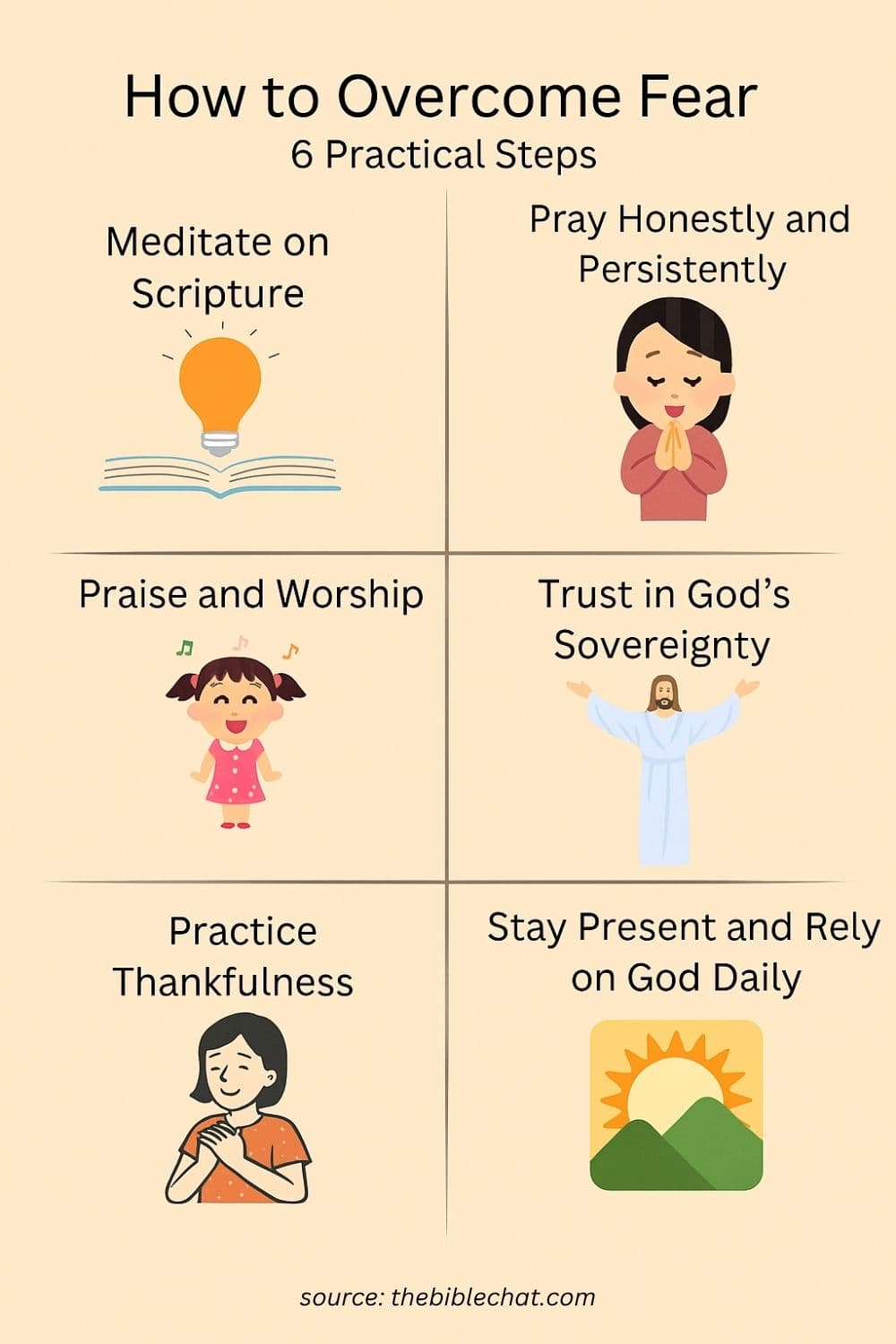What is Fear? Understanding Its Nature
Sometimes, fear isn’t just a threat to be dismissed; it’s a message waiting to be heard. It may be pointing to an old wound that hasn’t healed, a part of our story still waiting for redemption, or a signal from the soul that something is not aligned. When we listen with compassion, fear can become an invitation to heal, to grow, to return to God more deeply.
Fear is both emotional and physiological. It can protect us from harm, but when it becomes chronic, irrational, or spiritually misdirected, it becomes corrosive and exhausting.
From a neuroscientific and psychiatric perspective - check out the infographic below - fear begins in the amygdala, a part of the brain's limbic system responsible for detecting threats. When activated, it sends signals to the hypothalamus, which in turn triggers the sympathetic nervous system, initiating the fight, flight, or freeze response.
This leads to a chemical cascade:
- Adrenaline (epinephrine) increases heart rate, blood pressure, and energy supplies.
- Norepinephrine sharpens focus and redirects blood flow to essential muscles.
Cortisol, the primary stress hormone, maintains this alertness and suppresses nonessential functions (like digestion or immune response).
 During this time, the prefrontal cortex (the brain’s reasoning and spiritual reflection center) goes temporarily offline. This is why people experiencing acute fear often say, “I couldn’t think clearly” or “I just froze.”
During this time, the prefrontal cortex (the brain’s reasoning and spiritual reflection center) goes temporarily offline. This is why people experiencing acute fear often say, “I couldn’t think clearly” or “I just froze.”
But God has equipped us with the means to overcome. Read the Bible verses below:
- "Be anxious for nothing, but in everything by prayer and supplication, with thanksgiving, let your requests be made known to God; and the peace of God... will guard your hearts and minds through Christ Jesus." - Philippians 4:6–7 (NKJV)
- “You will keep him in perfect peace, whose mind is stayed on You, because he trusts in You.” - Isaiah 26:3 (NKJV)
Theologically, fear is a sign of our fragmentation, when the heart is pulled away from the presence of God and scattered by illusions, trauma, or distractions. Healing begins when we return to the stillness of being fully present to Him.
“The closer a man is to God, the more he is strengthened by Him and the less he fears the world.” - St. Isaac the Syrian
“Perfect love casts out fear.” - 1 John 4:18 (NKJV)
Biblical Stories of Fear and God's Response
Throughout the Bible, fear is not portrayed as a sign of weakness or failure, but as a deeply human experience, even for God’s chosen messengers. Time and again, Scripture reveals how moments of fear become pivotal encounters with God’s compassion and guidance.
Let’s examine two stories that show us that God does not abandon His people in their moments of anxiety or doubt:
1. Elijah Story
Consider the prophet Elijah (1 Kings 19), who, after a great victory, fled into the wilderness in fear and despair. He asked to die. But God met him not with rebuke, but with rest, food, and a gentle whisper. Fear didn’t disqualify Elijah - it became a doorway to deeper intimacy with God.
2. Jonah Story
Likewise, Jonah, running from God's call, was paralyzed by fear. Yet even in the belly of the fish, God's presence found him, redirected him, and gave him a second chance. These stories remind us that fear is not the end; it’s often the threshold to transformation.
Jesus in Gethsemane: How Fear and Faith Are Intertwined
Even Jesus, in His humanity, faced the anguish of fear. In the Garden of Gethsemane, we see Him deeply distressed, sweating drops of blood (Luke 22:44). He said, "My soul is exceedingly sorrowful, even to death" (Matthew 26:38, NKJV). His response was not denial or suppression, but surrender: "Nevertheless, not My will, but Yours, be done."
This moment is sacred. It shows that fear is not a failure of faith. It becomes holy when it drives us into deeper communion with the Father. Jesus modeled how to meet fear, not with resistance, but with prayer, honesty, and submission to God's love and will. In this sacred exchange, fear was not erased but transfigured.
“In the world you will have tribulation; but be of good cheer, I have overcome the world.” - John 16:33 (NKJV)
Epigenetic Fear: Inherited Wounds
Modern studies in epigenetics show that fear can be passed down generationally. Traumatic experiences, such as war, abuse, or abandonment, can chemically alter how genes are expressed. Descendants may inherit heightened fear responses, even without conscious memory of the original trauma.
While this may sound discouraging, the Bible reminds us that our story is not bound by biology. We are not doomed by the pain of the past, we are invited into restoration.
Here are some Bible verses that support this:
- “As one whom his mother comforts, so I will comfort you; you shall be comforted in Jerusalem.” - Isaiah 66:13 (RSVCE)
- “For I will restore health to you and heal you of your wounds, says the Lord.” - Jeremiah 30:17 (NKJV)
- “He heals the brokenhearted and binds up their wounds.” - Psalm 147:3 (NKJV)
The only way to truly heal transgenerational trauma is to acknowledge it, bring it before God in prayer, and re-graft ourselves into the vine that is Christ (John 15:5). Through Him, our family tree is no longer bound by fear, but rooted in perfect love.
Get Closer to God Today
4.9
Average Rating
|Over 5 Million Downloads
Discerning Holy Fear from Harmful Fear
Not all fear is destructive. The Bible speaks of a holy fear of God, a deep reverence and awe that draws us into wisdom, humility, and obedience.
“The fear of the Lord is the beginning of wisdom, and the knowledge of the Holy One is understanding.” - Proverbs 9:10 (NKJV)
This kind of fear is not about terror or shame; it is the trembling joy of standing before the sacred, the awareness of God’s greatness, and our dependence on Him. It heals us by putting all other fears into perspective.
But harmful fear, rooted in trauma, mistrust, or lies, draws us away from God. It isolates, confuses, and binds us. Recognizing the difference is key to spiritual discernment.
When Fear Becomes a Problem
Fear becomes a spiritual and emotional danger when it:
- Controls your decisions
- Overrides trust in God
- Causes paralysis or avoidance
- Leads to sin (e.g., lying, hiding, resisting God’s will)
“Do not fear the conflict, do not flee it. Where there is no struggle, there is no virtue.” - St. John of Kronstadt
But through God’s grace and the renewal of the mind, we are not powerless. The brain can be rewired. The heart can be restored. The spirit can be strengthened.
“Do not be conformed to this world, but be transformed by the renewing of your mind.” - Romans 12:2 (NKJV)
“The mind is not a vessel to be filled, but a fire to be kindled.” - Plutarch
Get Closer to God Today
4.9
Average Rating
|Over 5 Million Downloads
How to Overcome Fear: 6 Practical Steps
The following guide presents simple, biblical practices to help you overcome fear and draw closer to God’s steadfast presence, no matter what you face.
1. Meditate on Scripture
The Bible repeatedly encourages us to combat fear by focusing on God’s promises. Regularly reading, meditating on, and memorizing verses about God’s presence and faithfulness can strengthen your trust and provide comfort in anxious moments. Key passages include Isaiah 41:10 (“Fear not, for I am with you...”), Psalm 23:4, and 2 Timothy 1:7.
Read more Bible verses about fear.
2. Pray Honestly and Persistently
Prayer is a central biblical tool for overcoming fear. Bring your anxieties to God in prayer, expressing your worries and asking for His peace and strength. Praying through Scripture, such as Psalm 23, and asking God directly for courage and comfort are powerful practices.
Read our collection of prayers for good luck and success.
3. Trust in God’s Sovereignty
Scripture teaches that trusting in God’s control over every situation is a powerful antidote to fear. Proverbs 3:5-6 urges believers to “Trust in the Lord with all your heart and lean not on your own understanding.” Surrendering your fears to God and relying on His wisdom helps shift your focus from anxiety to faith.
4. Praise and Worship
Worship, whether through singing, listening to worship music, or expressing gratitude, shifts your attention from fear to God’s greatness. The Psalms often model this, with David praising God even in the midst of danger or distress (see Psalm 27 and Psalm 56).
It's understandable that you're seeking guidance on how to approach your prayers with both sincerity and openness to God's will. It is not wrong to bring your desires before God.
Read more Bible verses about worship.
5. Practice Thankfulness
Philippians 4:6-7 instructs believers to replace anxiety with prayer and thanksgiving: “Be anxious for nothing, but in everything by prayer and supplication, with thanksgiving, let your requests be made known to God.” Gratitude helps reframe your mindset and reminds you of God’s past faithfulness.
6. Stay Present and Rely on God Daily
Jesus taught His followers not to worry about tomorrow (Matthew 6:25–34). Focusing on God’s faithfulness in the present, rather than fixating on future “what-ifs,” helps anchor your heart in trust rather than fear.
A One-Minute Centering Prayer Practice
Try this anytime you feel fear rising:
- Sit quietly.
- Inhale: “God is my refuge.”
- Exhale: “I shall not fear.”
- Repeat for one minute, letting each breath anchor your awareness in His presence.
Or you can do this by simply using Bible Chat's feature - the Panic Button:
 How Bible Chat Can Help You Overcome Fear
How Bible Chat Can Help You Overcome Fear
For those walking through fear, sometimes what we need most is not just information, but interaction - someone (or something) to talk to when the night feels long or the anxiety feels heavy. That’s where Bible Chat comes in.
Bible Chat is a spiritually grounded, AI-powered tool designed to help you explore Scripture, ask hard questions, and find comfort in God’s Word, day or night. Whether you’re wrestling with fear, searching for a verse to anchor your soul, or simply needing reassurance of God’s promises, Bible Chat offers a gentle, faithful presence that always points back to truth.
Unlike a search engine or a generic chatbot, Bible Chat has been prayerfully developed with theological integrity in mind. It doesn’t just quote Scripture; it helps you reflect on it. It doesn’t shame your fear; it listens and guides you toward peace.
Many people use Bible Chat to:
- Ask questions about fear, anxiety, and how to trust God more deeply
- Discover comforting Bible passages that speak directly to what they’re feeling
- Pray through Scripture in real-time conversations
- Receive thoughtful, biblically aligned insights during moments of doubt
Whether you're journaling through a devotional, preparing for a Bible study, or crying out silently in your heart, Bible Chat can walk with you as a digital companion rooted in grace and truth. It doesn’t replace human fellowship or pastoral care, but it offers a powerful and accessible way to keep God's Word close, especially when fear tries to pull you away from it.
Download it now for free from App Store or Google Play!
Closing Prayer
Lord Jesus,
You are the Prince of Peace and the Shepherd of our hearts. In You, there is no fear, only love that casts it out. Help us to bring our anxious thoughts to You, to listen for Your voice in the storm, and to root ourselves deeply in Your presence. Heal the wounds of our past, still the tremors in our body, and renew our minds with Your truth.
We choose to return to You, not just in thought, but with our whole being. Let Your perfect love be the ground we stand on.
Amen.
Get Closer to God Today
4.9
Average Rating
|Over 5 Million Downloads
References:
- The Holy Bible, New King James Version. (1987). Thomas Nelson.
- The Holy Bible, Revised Standard Version, Catholic Edition. (1966). Ignatius Press.
- An honest reckoning with the amygdala and mental illness, https://pmc.ncbi.nlm.nih.gov/articles/PMC11611071/, accessed on 13.06.2025
- Understanding the stress response, https://www.health.harvard.edu/staying-healthy/understanding-the-stress-response, accessed on 13.06.2025
- Can the legacy of trauma be passed down the generations?, https://www.bbc.com/future/article/20190326-what-is-epigenetics, accessed on 13.06.2025












